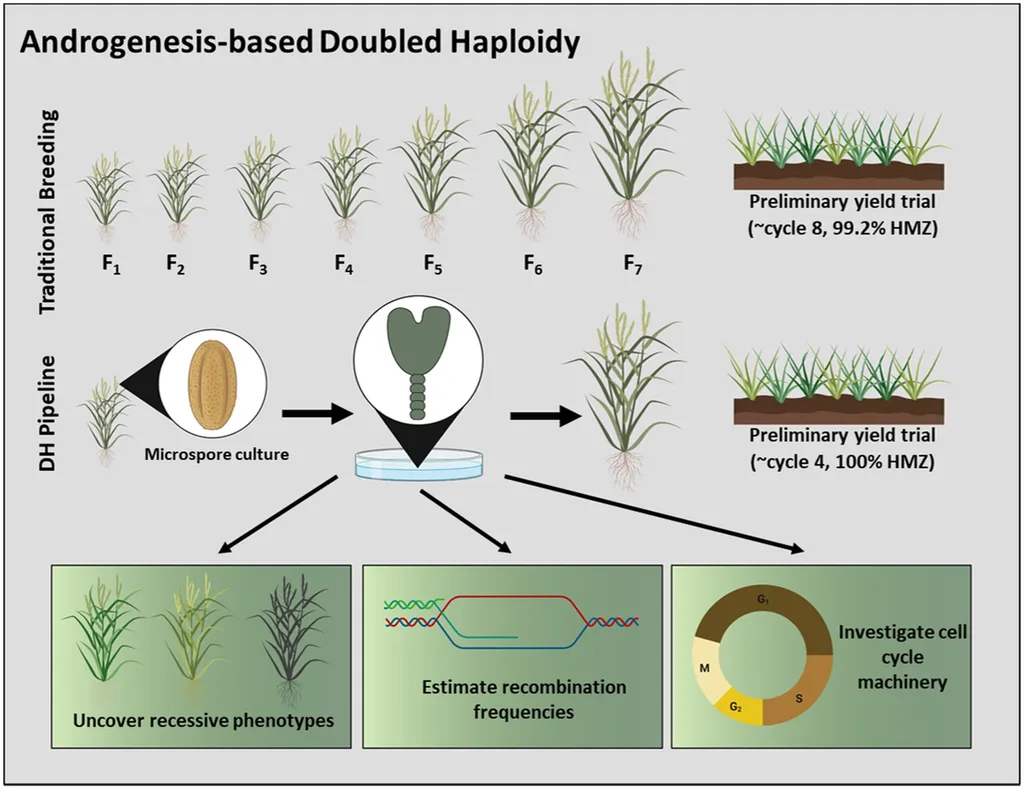In the quest to boost eggplant yields and improve crop sustainability, a team of researchers from the Department of Agronomy and Horticulture at IPB University in Bogor, Indonesia, has made significant strides using doubled haploid technology. Their study, published in the *Caraka Tani: Journal of Sustainable Agriculture*, focuses on the morpho-agronomic characterization and yield evaluation of doubled haploid eggplant lines derived from anther culture. This research could have profound implications for the agriculture sector, particularly in enhancing productivity and genetic diversity.
Doubled haploid technology is a breeding method that accelerates the development of pure lines by doubling the chromosomes of haploid cells, which are derived from pollen or anthers. This process allows for the creation of homozygous lines in a single generation, significantly speeding up the breeding process. “The use of doubled haploid technology is crucial for developing new varieties with desirable traits,” said lead author Reynatha Syafira Rizkiya. “It enables us to produce genetically uniform lines quickly, which is essential for both research and commercial applications.”
The study evaluated 35 doubled haploid lines alongside three commercial F1 varieties, assessing various morpho-agronomic traits such as plant height, stem diameter, days to flowering and harvesting, fruit length, fruit diameter, weight per fruit, number of fruits, and fruit yield per plant. The researchers found significant variability among the doubled haploid lines, indicating a rich genetic diversity that can be leveraged for breeding programs.
One of the key findings was the positive correlation between fruit yield and several agronomic traits, including plant height, dichotomous height, stem diameter, days to flowering, fruit length, and weight per fruit. Conversely, the number of fruits per plant showed a negative correlation with yield. “These traits can serve as important selection criteria for breeders,” explained Rizkiya. “Their high heritability and genotypic coefficients of variation make them valuable indicators of potential yield improvements.”
The selection index identified several high-yielding doubled haploid lines with desirable morpho-agronomic traits, including RS-P2, RS-P6, RS-P9, RS-P14, RS-P18, RS-H19, RS-H20, RS-H23, RS-H27, RS-H3, RS-M31, RS-M32, RS-M33, RS-M34, and RS-M37. Among these, the lines derived from Hitavi’s commercial hybrid stood out for their high yield and fruit quality, comparable to the parent variety.
The implications of this research for the agriculture sector are substantial. By identifying and selecting high-yielding lines with desirable traits, breeders can develop new eggplant varieties that are not only productive but also sustainable. This can lead to increased crop yields, improved farmer livelihoods, and enhanced food security. “The selected lines provide a strong genetic foundation for future breeding programs,” noted Rizkiya. “They offer a promising avenue for developing eggplant varieties that meet the demands of both farmers and consumers.”
As the global population continues to grow, the need for sustainable and productive agricultural practices becomes increasingly urgent. The research conducted by Rizkiya and her team represents a significant step forward in this endeavor, offering new tools and insights for breeders and farmers alike. By harnessing the power of doubled haploid technology, the agriculture sector can look forward to a future of enhanced productivity and sustainability, ultimately benefiting farmers and consumers worldwide.

